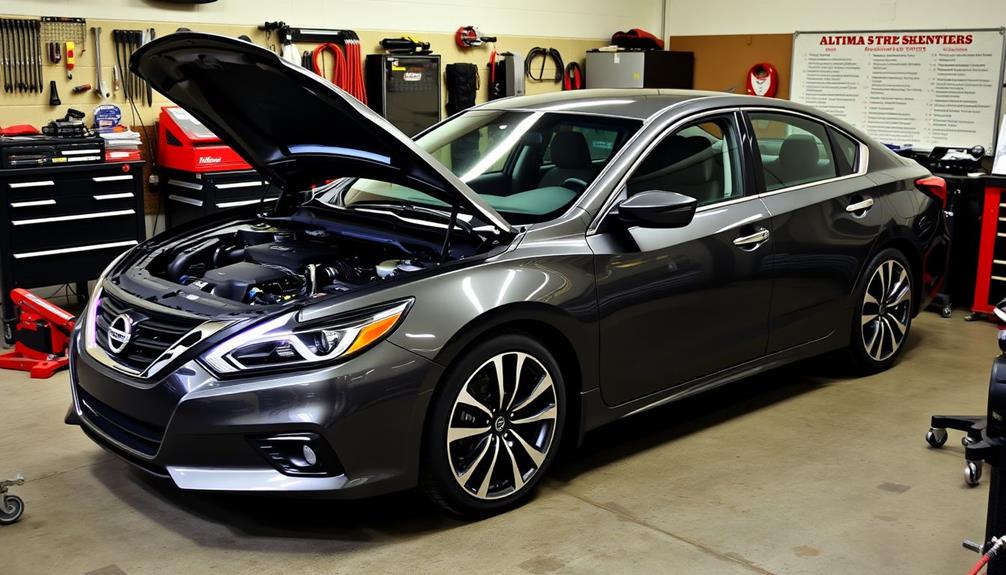Tuning your 2017 Nissan Altima can turn your sedan into a performance powerhouse. Start with a cold air intake kit to boost airflow and gain up to 10% more horsepower. Consider performance chips or ECU tuning for improved throttle response and torque. Upgrading the exhaust system not only enhances sound but also elevates performance at higher RPMs. Don't overlook high-performance spark plugs for better ignition efficiency. Regular maintenance remains essential to keep your enhancements reliable and effective. Curious about more tuning options and tips? You're just getting started on this thrilling journey.
Key Takeaways
- Install a cold air intake kit to improve airflow, potentially boosting horsepower and torque by up to 10%.
- Upgrade to a performance exhaust system like the Stillen Catback for enhanced sound and higher RPM performance.
- Use performance chips or ECU tuning to enhance throttle response and optimize engine performance effectively.
- Regular maintenance, including oil and filter changes, is crucial for maintaining reliability after performance upgrades.
- Engage with the Nissan enthusiast community for shared experiences and advice on achieving peak performance without compromising durability.
Tuning Considerations for the Altima
When tuning your 2017 Nissan Altima, there are several key considerations to keep in mind. First, you'll want to explore a Cold Air Intake Kit, which can greatly enhance airflow and improve engine sound. This modification can lead to a horsepower boost of up to 10%, making it a favorite among enthusiasts.
However, remember that tuning considerations extend beyond just adding parts. If you're considering performance chips, verify they're compatible with the factory ECU. Mismatched chips can create performance issues, so check user reviews and community insights on platforms like Nissan Club.
ECU tuning is another advanced modification that can optimize engine performance, but timing adjustments must align with the ECU's programming to yield the best results.
Don't underestimate the value of professional tuning advice after making modifications. Experts can guide you through optimizing your Altima's performance while guaranteeing reliability.
Engaging with fellow Nissan Altima owners can also provide insights that help in making informed decisions about your tuning journey. By taking these factors into account, you’ll be well on your way to transforming your sedan into a performance powerhouse. If you’re driving a Nissan Altima 2001 and considering tuning options, connecting with other owners who have already modified their vehicles can be especially valuable. They can share their experiences with different upgrades and offer advice on what worked best for them. Knowing how to navigate the world of Nissan Altima 2001 tuning can make the process smoother and more rewarding.
Essential Performance Modifications

To open up the true potential of your 2017 Nissan Altima, several essential performance modifications can make a considerable difference. By focusing on key upgrades, you can enhance horsepower, torque, and overall engine performance.
| Modification | Benefits |
|---|---|
| Cold Air Intake System | Improves airflow, boosts horsepower & torque by up to 10% |
| Performance Chip | Enhances throttle response & fuel efficiency with easy installation |
| Exhaust System | Stillen Catback exhaust improves sound & overall performance |
| High-Performance Spark Plugs | Maximizes ignition efficiency for better combustion |
Upgrading to a cold air intake system can greatly enhance airflow, especially beneficial for the 2.5L and 3.5L engines in the Altima. A performance chip, like a Stage 1 OBD2, can boost throttle response and fuel economy. Installing a Stillen Catback exhaust not only elevates the sound but also contributes to improved performance metrics. Finally, using high-performance spark plugs guarantees your engine runs efficiently, providing a hotter spark for peak combustion. Don't forget to monitor your vehicle regularly post-modifications to maintain reliability and longevity of your enhancements.
User Experiences and Feedback

User experiences with performance modifications on the 2017 Nissan Altima vary widely, revealing a spectrum of results. Many users report that cold air intakes serve as an effective initial upgrade, with some achieving modest horsepower gains of up to 10%. They love the enhanced engine sound that comes with this modification.
However, not everyone shares the same success; some drivers experience minimal improvements or even power loss, emphasizing the importance of RPM ranges in gauging effectiveness. Benefits are often more noticeable at higher RPMs.
Tuning adjustments can greatly impact your Altima's performance, but they must be handled carefully. Users frequently discuss the potential pitfalls of timing changes during tuning, which can lead to issues if not executed under ideal conditions.
This is why many enthusiasts recommend seeking professional consultation before making considerable modifications.
Within the Nissan Club community, discussions reflect a balanced view, weighing the trade-offs between increased power and potential impacts on reliability. As you explore performance enhancements, consider these user experiences to guide your decisions and help you achieve the best results with your Altima.
Community Insights and Recommendations

When considering modifications for your Nissan Altima, tapping into community insights can be invaluable.
You'll find that many enthusiasts share their experiences with different tuning techniques, highlighting the vital balance between performance and reliability.
Shared Modification Experiences
Many Nissan Altima owners have shared their tuning journeys, offering valuable insights into what modifications truly enhance performance. One standout suggestion is installing a cold air intake, which can boost horsepower and torque by up to 10%.
Many enthusiasts rave about the noticeable improvements in throttle response and fuel efficiency after adding performance chips and tuning the ECU. However, it's vital to approach ECU tuning with caution, as improper timing adjustments may lead to engine issues.
Here are some key takeaways from the community:
- Quality installation of aftermarket parts is essential for peak performance.
- Regular maintenance is necessary to guarantee the longevity of your modifications.
- Sharing experiences helps others avoid common pitfalls in tuning.
- Enthusiasts emphasize the importance of understanding your specific goals for your Nissan Altima.
Whether you're aiming for improved torque or simply want to feel the rush of enhanced horsepower, these shared experiences can guide you on your tuning journey.
Preferred Tuning Techniques
With various modifications in mind, enthusiasts often highlight preferred tuning techniques that maximize the performance of the 2017 Nissan Altima. Starting with a cold air intake system can notably improve airflow, potentially boosting horsepower and torque by up to 10%. Following that, consider ECU tuning; it optimizes engine settings for better throttle response and fuel efficiency. Performance chips are a great, safe, plug-and-play option for achieving these enhancements.
It's essential to understand RPM ranges when making modifications. Performance gains are more noticeable at higher RPMs, so proper tuning is vital. After these initial upgrades, many enthusiasts recommend the Stillen Catback exhaust system to enhance both sound and performance.
Engaging with the community on platforms like Nissan Club can provide valuable insights and recommendations. Here's a quick summary of preferred tuning techniques:
| Modification | Benefits | Community Recommendation |
|---|---|---|
| Cold Air Intake System | Boosts horsepower and torque | Highly recommended |
| ECU Tuning | Optimizes throttle response | Essential for performance gains |
| Stillen Catback Exhaust | Enhances sound and performance | Popular next step |
Performance Vs. Reliability Balance
Striking the right balance between performance and reliability is vital for any Nissan Altima enthusiast looking to enhance their vehicle. While you might be keen to boost horsepower and torque with performance chips or cold air intakes, it's important to remember that these modifications can come with risks if not executed properly.
Consider these community insights:
- Performance upgrades can lead to engine stress, impacting your engine lifespan.
- Poor installation of cold air intakes may yield disappointing results.
- Neglecting maintenance schedules can turn your performance powerhouse into a reliability nightmare.
- Consulting professionals for tuning advice guarantees you maximize performance without sacrificing durability.
To truly enjoy the benefits of your modifications, focus on maintaining regular maintenance schedules. This practice helps confirm your Altima performs at its best while keeping reliability in check.
Engaging with fellow enthusiasts and seeking their experiences can guide you in making informed choices. Aim for that sweet spot where performance enhancements complement the inherent reliability of your vehicle, allowing you to enjoy every drive without worry.
General Maintenance Practices

To keep your 2017 Nissan Altima running smoothly, prioritize routine oil changes and stick to a filter replacement schedule.
These simple practices not only boost engine performance but also help extend its lifespan.
Routine Oil Changes
Routine oil changes are an indispensable part of keeping your Nissan Altima 2017 running smoothly. They play a crucial role in maintaining your engine's performance and longevity. Ideally, you should change the oil every 5,000 to 7,500 miles, depending on the oil type used.
Regular oil changes help remove contaminants that can affect engine function and efficiency.
Here are some key benefits of routine oil changes:
- Enhances engine performance by guaranteeing smooth operation.
- Improves fuel efficiency, saving you money at the pump.
- Protects your engine's longevity from wear and tear.
- Maintains warranty compliance and boosts resale value.
Using synthetic oil provides even better protection, especially under high temperatures or extreme driving conditions.
Don't forget to check your oil levels frequently; low oil can lead to severe engine damage and costly repairs.
By following the manufacturer's recommendations for oil type and change intervals, you guarantee your Altima remains a performance powerhouse for years to come.
Regular oil changes aren't just about maintenance; they're about preserving the health and efficiency of your vehicle.
Filter Replacement Schedule
Regularly keeping up with your filter replacement schedule is crucial for maintaining the performance and comfort of your Nissan Altima 2017.
Start with the engine air filter, which you should replace every 15,000 to 30,000 miles. Doing so guarantees peak airflow and enhances engine performance.
Don't forget about the cabin air filter; replace it approximately every 15,000 miles or once a year to keep the air inside your vehicle clean and fresh.
Next, consider your fuel filters, which generally need replacement every 30,000 to 40,000 miles. This helps prevent contaminants from harming your fuel system and guarantees efficient fuel delivery.
For your oil filter, it should be changed with every oil change, typically every 5,000 to 7,500 miles when using synthetic oil for the best results.
Lastly, monitor your transmission fluid filter. Aim to replace it every 30,000 to 60,000 miles to keep your transmission running smoothly.
By sticking to this filter replacement schedule, you'll not only maintain your Altima's performance tunes but also enhance its longevity and reliability on the road.
Regular maintenance is key!
Performance Chips and ECU Tuning

Performance chips and ECU tuning consistently offer Nissan Altima owners an effective way to boost their vehicle's performance. By installing a performance chip, like the Stage 1 OBD2 module, you can enhance your Altima's horsepower and torque through easy Plug n Play installation. You'll feel the difference in throttle responsiveness, making your drives more exhilarating.
Here are some exciting benefits of performance chips:
- Significant gains in horsepower and torque
- Improved fuel efficiency for daily driving
- Real-time performance metrics with advanced chips
- Safe, with money-back guarantees for peace of mind
With options like the Stage 3 Performance Chip featuring a next-generation multi-core CPU, you're looking at maximized engine performance tailored for your Nissan Altima.
Meanwhile, upgrading to a Stage 4 chip lets you track improvements directly through an LCD monitor.
These latest ECU tuning technologies not only enhance throttle responsiveness but also resonate well with performance enthusiasts seeking to reveal hidden engine potential without complex modifications.
Whether you drive an S, SR, SV, or SL model, performance chips provide a valuable upgrade to elevate your driving experience.
Aesthetic Enhancements and Upgrades

Aesthetic enhancements can transform your 2017 Nissan Altima into a standout vehicle that reflects your personal style. By integrating these upgrades, you'll not only improve the car's aesthetic appeal but also elevate its performance upgrades.
| Enhancement | Description |
|---|---|
| Custom Headlights | Upgrade to Halo projectors for better visibility and a striking look, costing $600-$700 for installation. |
| Upgraded Wheels | Choose stylish wheels to enhance handling and make a strong visual impact. |
| Window Tinting | Tint your windows (15-20%) for privacy and heat reduction while adding a sleek touch. |
| Body Kits | Install body kits for an aggressive stance, appealing to those seeking a sporty look. |
| LED Lighting | Modernize your Altima with customizable LED lighting, adding a contemporary flair. |
Each of these upgrades not only adds to the visual impact of your vehicle but also contributes to a more dynamic driving experience. So whether you want to enhance visibility, improve handling, or just make your sedan look exceptional, these aesthetic enhancements will surely elevate your Altima to the next level.
Frequently Asked Questions
How to Add Horsepower to a Nissan Altima?
To add horsepower to your Nissan Altima, consider installing a cold air intake, a performance chip, or a catback exhaust system. Regular maintenance with synthetic oil and performance spark plugs will also enhance engine efficiency and power.
Can You Make a Nissan Altima Faster?
Yes, you can make your Nissan Altima faster by upgrading to a cold air intake, installing a performance chip, and enhancing the exhaust system. Regular maintenance also keeps your engine running efficiently, boosting performance.
How Much Horsepower Can a Nissan Altima Handle?
You'll find your Nissan Altima can safely handle around 300 horsepower. However, if you push beyond that, you risk reliability issues, so keep an eye on performance and make adjustments to maintain longevity.
What Do You Need for a Tune-Up on a Nissan Altima?
For a tune-up on your Nissan Altima, you'll need to replace spark plugs, change the oil and filter, inspect fuel filters, clean or upgrade the air filter, and check O2 sensors for peak performance.
Conclusion
So, you might think tuning your 2017 Nissan Altima is too complicated or costly, but it doesn't have to be! With the right modifications, you can easily boost performance without breaking the bank. Plus, the community support and shared experiences make the journey even more enjoyable. Embrace the challenge, and you'll transform your sedan into a thrilling powerhouse. Get out there, explore your options, and see just how exhilarating your Altima can truly be!










